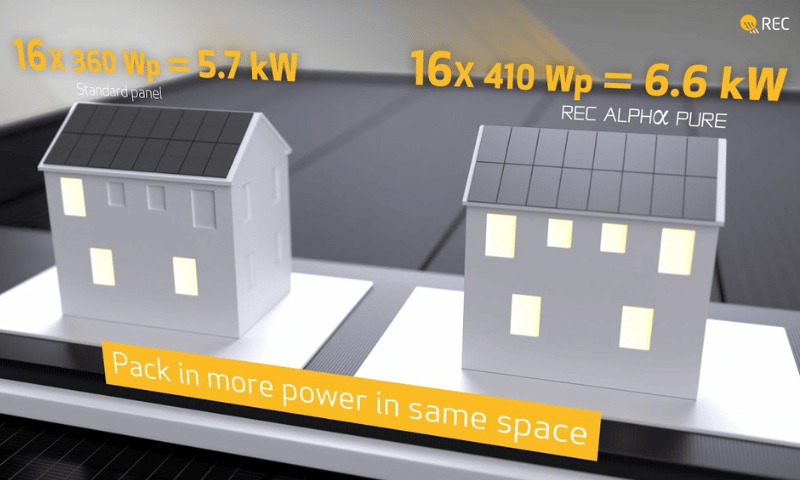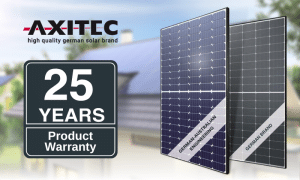Going solar can be a complex decision, there are a number of factors to consider including the size of your roof, shading, household energy consumption, the right inverter, how long you plan to live at the property and many more.
Over the coming weeks, REC will be taking a deep dive into some of these key factors when assessing solar panels as part of our get better, not bigger series. This information will help you cut through the noise and make an informed decision for your household.
We are starting here with power density.
What is power density?
Power density in relation to solar panels is the amount of energy or power, measured in watts, generated per meter squared.
The higher the power density, or watts/m2, the more powerful your solar panel is. For example, the REC Alpha Pure-R has a power density of 223 watts/m2 and a total power output of 430 Wp per panel.

Why is this important?
Solar power density is an important metric, but it can be overlooked in favour of top-end power output. In your research, you may come across some solar panels with a very high output in the range of 500 – 700 Wp. While at face value a higher Wp appears to be more powerful, it does not take into account the size of the panel and there are no guarantees you are measuring apples with apples when using this metric to compare.
For example, if a 600 Wp panel was 3m2 that would mean the power density is 200 watts/m2. Essentially, you would not be maximising your roof space.

What does this mean for your solar system?
If the performance of your rooftop solar is lacking, it won’t offset your bills to the degree it should, nor will it maximise the feed-in tariffs, resulting in a poorer return on investment.
As residential homeowners or business owners, we have a finite amount of roof space to use so we need to maximise this to our benefit. By choosing a higher power density panel you will need less space for the same overall output, which may even allow space for additional panels, further increasing the performance of the system.

To illustrate the concept you could achieve a total of 6.02 kilowatts (kW) from 14 REC Alpha Pure-R panels, whereas you would need 17 standard 360 Wp panels to achieve the same output.
You may only be able to fit 14 panels on your roof, alternatively, you could boost your total output to 7.31 kW by adding three additional high-power density panels for the same roof space required.
How can you use this concept?
The benefit of comparing panels by power density is that it will give you an objective comparison point to assess two different panels. Information for this should be available on the manufacturer’s website, otherwise, you can ask your local solar installer when it comes to choosing your panel.
Even if you don’t need a maximum output system right now, electric vehicles and at-home charging are set to fundamentally change the way we interact with household energy in the not-too-distant future. Having the space to add panels later on without replacing your system will give you options and flexibility.
When it comes to large purchases such as solar panels, it’s best to do your research and look beyond the price point to get better, not bigger. Consider things like solar power density, longevity, and even warranty. That way, you can rest assured knowing you’re purchasing a quality solar panel that will stand the test of time and generate a healthy return.
For further information on the Alpha Pure-R visit REC Group today.
Get rooftop solar panels in Melbourne. Energy Matters has a nationwide network of trusted local solar installers in Melbourne that you can access today that can provide you with up to 3 Free Solar Quotes. Complete our quick quiz and switch to solar in Melbourne today.













































